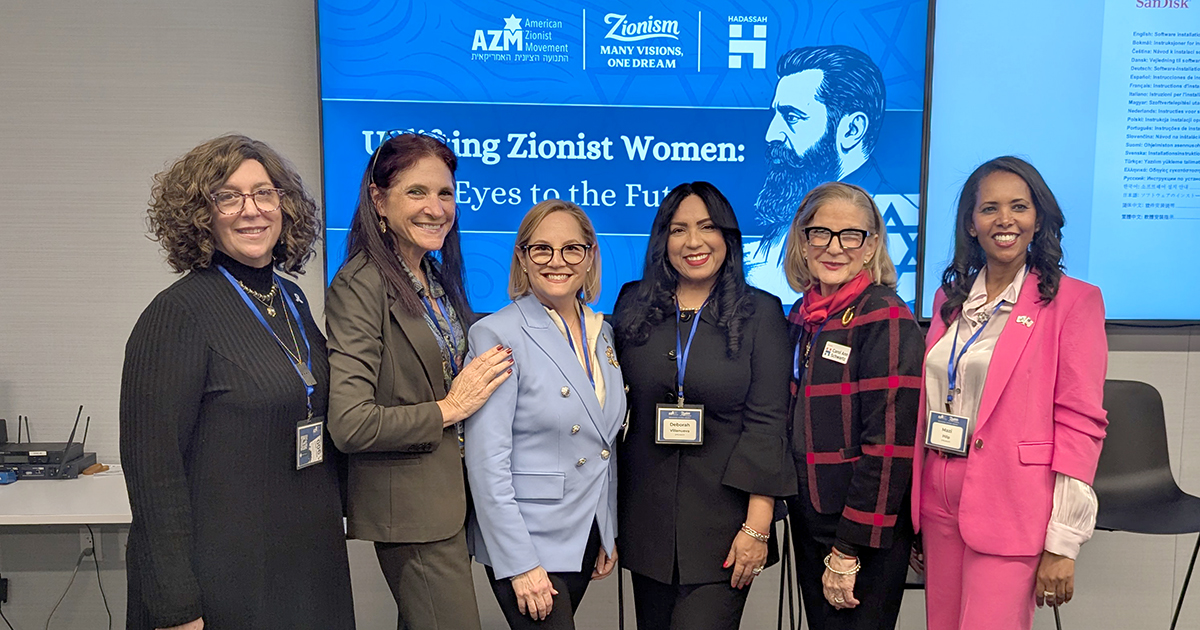Like each generation that has come before us, we know that our future is tied to the fate of our youth. As Hadassah women, we are bridges between the past and the future, and bridges between the United States and Israel.
As Hadassah volunteer leaders, we follow in some very big footsteps. Like our predecessors, we spend a lot of time in meetings — online and in person, from our cars, on trains, even while on the treadmill.
We strive to ensure a strong Israel by focusing on youth — youth in Israel and youth in America.
So let's talk about youth. Here's what we hear a lot: younger Americans don't care about Israel. What we know firsthand, though, is about the ones who do. That's one reason why our work with Young Judaea has so much meaning. Each day, we strive to grow the numbers of American youth who, like us, feel Israel in their hearts, their kishkes.
"I believe it is vital for young Jewish adults to visit Israel to strengthen their connection and really understand its importance," said one Hadassah Leaders of Tomorrow Awardee, returning to the US from a Hadassah-funded Israel trip. For four weeks, she built her leadership skills among peers at Young Judaea's Teen Summer Program, Machon. "Now that I am back home, I am so excited to share my experiences with others and continue to be a strong advocate for Israel."
"Like each generation that has come before us, we know that our future is tied to the fate of our youth."
To understand Israel's youth, it's important to realize just how fundamentally different being a teen in Israel today is from being a teen in the United States, whether as an immigrant or a native.
For American teens, the horizon tends to hold either college, trade school, a gap year, or a job — with a minority going into the military. You may even discover a few Young Judaeans who join the IDF to protect Israel, the state they love.
For Israelis, with a few exceptions, military service at 18 is obligatory. That means spending two to three years serving and protecting Israel, in times of peace and in times of violence. It's a heavy responsibility at any age — and a different mindset. Yet most expect it and look forward to it.
In return, many make the kinds of connections that last a lifetime, socially and professionally. Their military references will help them get jobs they want, and in many ways their military posting will shape the rest of their lives.
Among those in the IDF are teens from three Hadassah-supported Youth Aliyah villages, joining their peers from around the country. Over time, Youth Aliyah has evolved along with Israel. Originally resettling children escaping Nazi Europe, today Hadassah villages serve both immigrants and at-risk children in Israel: Jews, Arabs, Druze, Bedouin, and more. Many of our students are refugees.
Take Louis, who recently won the Tiberias half marathon. At the age of 12, Louis left his homeland, war-torn Eritrea, and walked all the way to the Israeli border, dodging armed border guards and kidnappers along the way. At Hadassah-Neurim he found a home, caught up in his studies, and learned Hebrew. Now 21, he lives and trains at Neurim and is Israel's top runner for his age group.
About a third of the students at our Youth Villages have been sent by their parents from former Soviet Union countries. A third come from Ethiopian families. And 40% come from difficult family situations in Israel, escaping physical or sexual abuse at home or a family that can't afford to take care of them. In fact, one in three children in Israel lives in poverty.
For at-risk children, coming to Hadassah's Youth Villages shifts the course of their lives — they are set on a path to success. We could share story after story of students who have made a mark in Israeli society, thanks to the education, training and community they found at Hadassah Neurim, Meir Shfeyah and Ramat Hadassah Szold. "I was a terrible student, getting up every morning at 3:00 am to fish, so that I could help my parents put bread on the table,... Hadassah Neurim never gave up on me," said Israel Finance Minister Moshe Kahlon during a visit to the village.
Israel has surpassed many of our wildest dreams — the Startup Nation. But Israel — and its youth — still need us. Our obligation doesn't end. Our commitment to a strong future for Israel must manifest itself in a commitment to Israeli youth and the fostering of a love for Israel in American Jewish youth.
Barbara Spack is the Hadassah National Chair of Young Judaea and a National Board member/portfolio holder for over 40 years.
Carol Goodman Kaufman serves as the Hadassah National Chair of Youth Aliyah and been on the National Board/Portfolio Council since 2005.
Learn more about Hadassah-supported Youth Villages in Israel >
Listen to this inspiring podcast about Israeli youth: The Branch: It Takes a Village >
Find out about our Hadassah Leaders of Tomorrow >



.svg)






